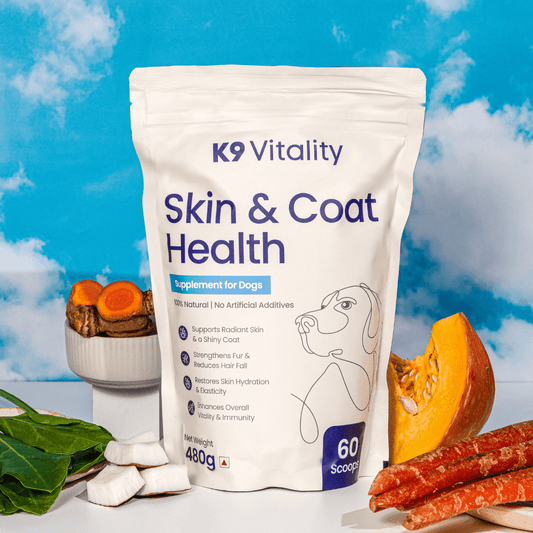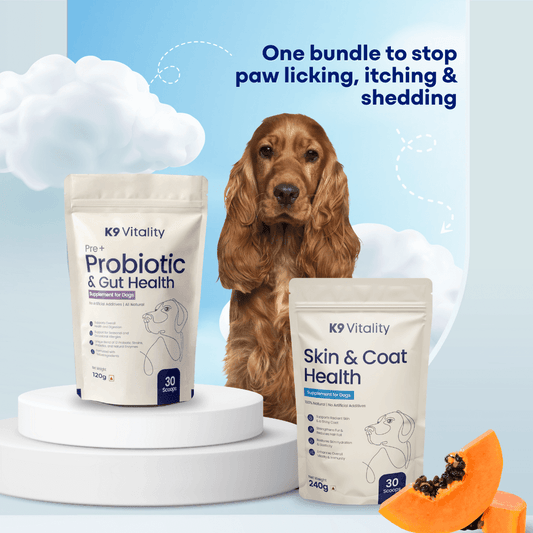
How to Choose the Right Probiotic for Your Dog
Share
As a loving dog parent, you always want the best for your pets. You ensure they eat a nutritious diet, get regular exercise, and receive proper medical care. But have you ever considered the role of probiotics in their overall health?
Probiotics are beneficial bacteria that support digestion, immunity, and overall well-being in dogs. But with so many options on the market, how do you choose the right one? More importantly, why are probiotics essential for your pup’s health?
K9 Vitality is here to guide you through everything you need to know about selecting the best probiotic for your dog, ensuring they lead a happy, healthy, and energetic life.
Understanding Probiotics: What Are They and How Do They Work?

Probiotics are live microorganisms that, when administered in adequate amounts, provide numerous health benefits. Just like in humans, a dog’s gut is home to trillions of bacteria, both good and bad. Probiotics help maintain a balance by increasing the number of beneficial bacteria while keeping harmful bacteria in check.
Key Benefits of Probiotics for Dogs:
- Improved Digestion – Helps break down food and absorb nutrients efficiently.
- Stronger Immunity – Supports the immune system by fighting harmful pathogens.
- Reduced Allergies & Skin Conditions – Balances gut flora, which can reduce allergic reactions.
- Better Stool Quality – Helps with diarrhea, constipation, and other digestive issues.
- Mental Well-being – A balanced gut can positively impact mood and behavior.
Now that we understand why probiotics are essential, let’s explore how to choose the right one for your dog.
Factors to Consider When Choosing a Probiotic for Your Dog

Not all probiotics are created equal. Here are some crucial factors to consider when selecting the best one for your dog:
1. Types of Probiotic Strains
Different probiotic strains serve different functions. Some of the most effective strains for dogs include:
- Lactobacillus acidophilus – Supports digestion and nutrient absorption.
- Bifidobacterium animalis – Helps with diarrhea and improves stool quality.
- Enterococcus faecium – Strengthens immune function.
- Saccharomyces boulardii – A beneficial yeast that aids in treating gastrointestinal disorders.
Look for a probiotic supplement that contains a combination of these strains for comprehensive gut support.
2. CFU Count (Colony Forming Units)
The effectiveness of a probiotic depends on the number of live bacteria present. The CFU count should be in the range of 1-10 billion per serving for optimal benefits. A higher CFU count ensures that enough bacteria survive the digestive process and reach the intestines.
3. Delivery Method: Powder, Chews, or Capsules?
Probiotics come in various forms, and choosing the right one depends on your dog’s preference and ease of administration.
- Powders: Easily mixed into food, ideal for picky eaters, and provide dosing flexibility.
- Chews: Tasty and easy to give as treats but may contain additional ingredients.
- Capsules: Suitable for dogs comfortable swallowing pills or can be hidden in treats.
Choosing a form that your dog enjoys and accepts readily will ensure consistent and effective probiotic intake.
4. Added Prebiotics for Enhanced Effectiveness
Prebiotics are dietary fibers that act as food for probiotics, helping them thrive in the gut. Some of the best prebiotics include:
- Inulin
- Fructooligosaccharides (FOS)
- Pumpkin fiber
A probiotic supplement with added prebiotics will be more effective in promoting gut health.
5. Third-Party Testing & Quality Assurance
Always opt for a probiotic supplement that has been vet-recommended and third-party tested for safety and effectiveness. Check for certifications and read customer reviews to ensure you’re buying from a reputable brand.
6. Allergen-Free & Natural Ingredients
Avoid probiotics that contain artificial additives, preservatives, or common allergens like wheat, soy, and dairy. A high-quality probiotic should be made with natural, pet-safe ingredients.
When Should You Give Your Dog Probiotics?

Probiotics can be beneficial in various situations, including:
- During & After Antibiotic Treatment – Antibiotics can wipe out both harmful and beneficial bacteria. Probiotics help restore balance.
- If Your Dog Has Digestive Issues – Chronic diarrhea, constipation, or bloating indicate an imbalance in gut bacteria.
- For Stress & Anxiety – Travel, vet visits, or changes in routine can disrupt gut health, leading to digestive issues.
- For Aging Dogs – As dogs age, their digestive efficiency declines. Probiotics support gut and immune health.
Common Myths About Dog Probiotics
Myth #1: "Dogs Don’t Need Probiotics."
Reality: Just like humans, dogs have a complex microbiome that requires balance for optimal health. Probiotics help maintain that balance, ensuring a healthier gut and stronger immunity.
Myth #2: "Yogurt is a Good Probiotic for Dogs."
Reality: While yogurt contains probiotics, it also has lactose, which many dogs struggle to digest. A high-quality dog-specific probiotic is a much better choice.
Myth #3: "More Probiotics Means Better Results."
Reality: The quality, variety of strains, and balance of probiotics matter more than just a high CFU count. The right combination of strains ensures maximum effectiveness.
Final Thoughts: Prioritize Your Dog’s Gut Health
Your dog’s gut health is a key factor in their overall well-being. A well-balanced microbiome ensures better digestion, stronger immunity, and a happier, more active life. By choosing a high-quality probiotic with the right strains, CFU count, and added prebiotics, you can support your furry friend’s long-term health.
At K9 Vitality, we are committed to helping dog parents make informed decisions about their pet’s health. Whether you need guidance on probiotics or other aspects of canine wellness, we are here to support you every step of the way.






